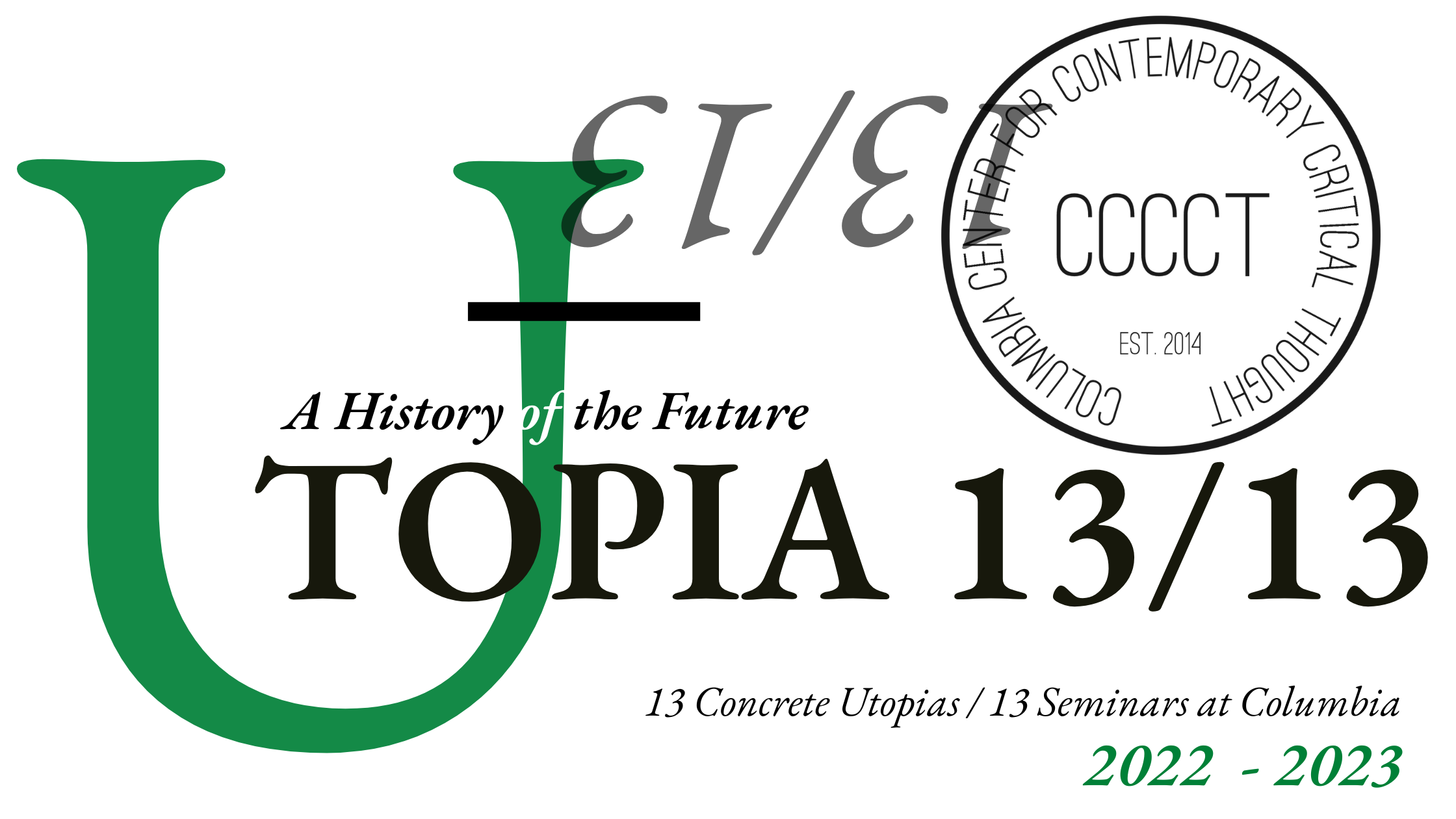By Leah Haberman
1. “Community is key to concrete utopias”
Towards the end of Etienne Balibar’s lecture, he talked of the importance of community to the ideation, creation, and maintenance of concrete utopias. The phrase jumped out at me, and then even more so when he continued to talk of the Black Lives Matter movement. I noticed throughout the lecture that cooperatives or cooperative living communities were discussed in an almost idyllic way, as the closest way to Utopia. The idea of cooperative living and of egalitarianism seem inextricably linked in the idea of Utopia. But what is the relationship between the two?
It seems intuitive that community would be essential to Utopia. Balibar summarized much of utopian literature, from Thomas More on, as a critique of private property. But does the concept of community necessarily demands equality and vice versa? Even in an utopian community, there may need to be different roles. On the Kibuttzim in Israel, a cooperative lifestyle, there are assigned roles that play to people’s strengths. I think this underscores a tension in utopian thinking. Balibar acknowledged that there is no guarantee that the creation of a utopian society in one generation would not then seem like a prison to the next. There’s a fluidity to the conception of community as it intertwines with equality, equity, and hierarchy that calls for further reflection.
2. “Progress blends into catastrophe.”
Professor Balibar focused on three disasters—the climate, nuclear, and digital catastrophes—all of which are consequences of human progress: the industrial revolution, the scientific revolution, and the information revolution. Innovation is a way of imagining a better future, but all these forms of progress have tipped beyond Aristotle’s golden mean into the realm of excess and chaos. The question is, can we come back from the brink, move away from the precipice of disaster? Is it possible to have a utopia with the looming threat of nuclear disaster over us? Professor Balibar ended his section on nuclear disaster postulating that the unstable peace we exist in now might be the Utopia, that this “before time” of any nuclear war may be the only feasible utopia as a world with no nuclear weapons is no longer feasible.
This same concept can be extrapolated to the climate and digital disasters. There is no ability to put the genie back into the bottle, nor would most people be willing to make the sacrifices to do so. What sacrifices would be necessary?
Hurricane Ian’s devastation in Florida is one of the many natural disasters that show an escalation of the frequency and intensity of natural disasters. We all know that we are at the point of no return, and yet people are still investing in fossil fuels. In 2021, I was working for Tom Steyer doing climate activism. We were discussing how to push the investor class towards clean energy. One day while meeting, we saw that Warren Buffet had invested in Chevron. Tom and I agreed that there’s no way he doesn’t know about the consequences of climate change, but that some people “try to catch a falling knife”. Fossil fuels still drive our economy, and until that changes people will still invest in them; but fossil fuels will never not drive our economy until people stop investing. Creating a utopia is not easy or pleasant. It takes sacrifice, inconveniences—but those are especially hard for ordinary people existing day-to-day and filling up their gas tanks.
3. “What to do with the theoretical baggage of utopia.”
In Professor Harcourt’s introduction, he articulated how comfortable we are with dystopian language. I was raised on fictions like The Hunger Games or Divergent. My generation is conversant in doom and gloom, fluent in negativity. If anything, utopian thinking has become associated with a child-like naïveté and treated with the scorn that atheists treat believers.
The criticism of social-media-activism is that it is much easier to offer criticisms of a system than to offer solutions. In a way, we’ve created the heterotopia of idealism and pessimism for the utopian mindset of pragmatism. As a society, it seems we conflate idealism with naïveté and pessimism with a form of laziness. It has led to the glorification of the pragmatist. But what role is there for pragmatism in utopian thinking?
Professor Balibar, quoting Erik Olin Wright, mentioned the possibility of “pragmatic utopias”. The goal of this lecture series, on my understanding, is to come up with real solutions, real lines of escape, real experiences of utopia in a time where disastrous thinking reigns supreme. The example of Black Lives Matter, asking for Black people to be treated equally, to not live with the threat of systemic violence, is (to me) a pragmatic utopia. Legislation that bans fossil fuel cars is a pragmatic utopia. The interesting thing is that these utopic solutions seem to necessitate some sort of government intervention which begs the question: is any utopia on a grand scale possible without government and can government ever be utopic?
I’ll be curious next week when we hear about the concrete example of Cooperation Jackson if the takeaway is that utopia is only feasible in microcosms of our larger society. But if this is true and utopia is only feasible on the small scale, than what is the solution for these global issues at the scale of climate change? Maybe, harkening back to the first point of “community,” it calls for a consciousness reframe to see ourselves as part of the global community rather than a localized one.
